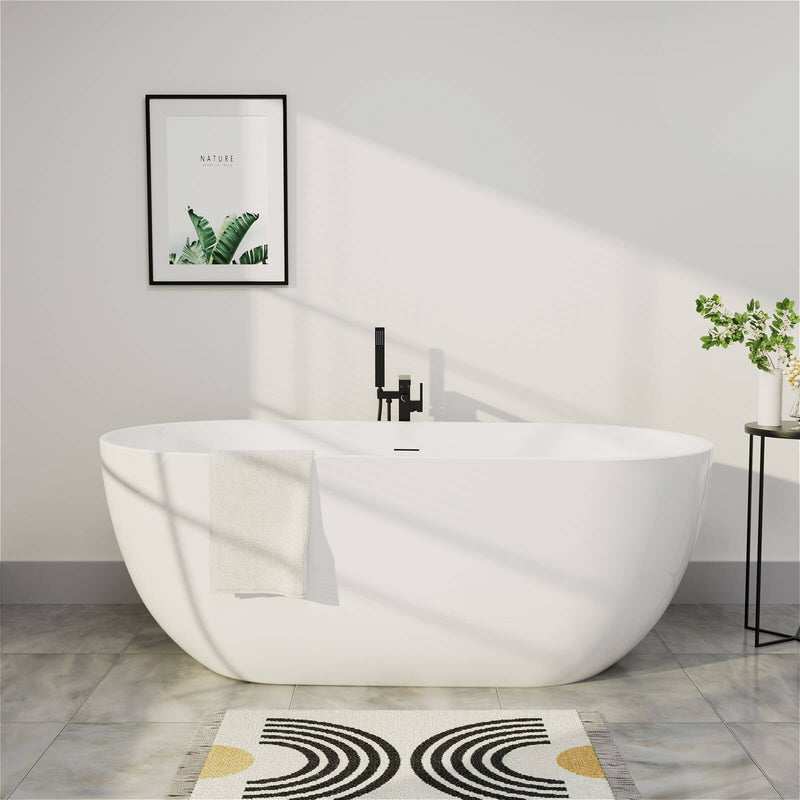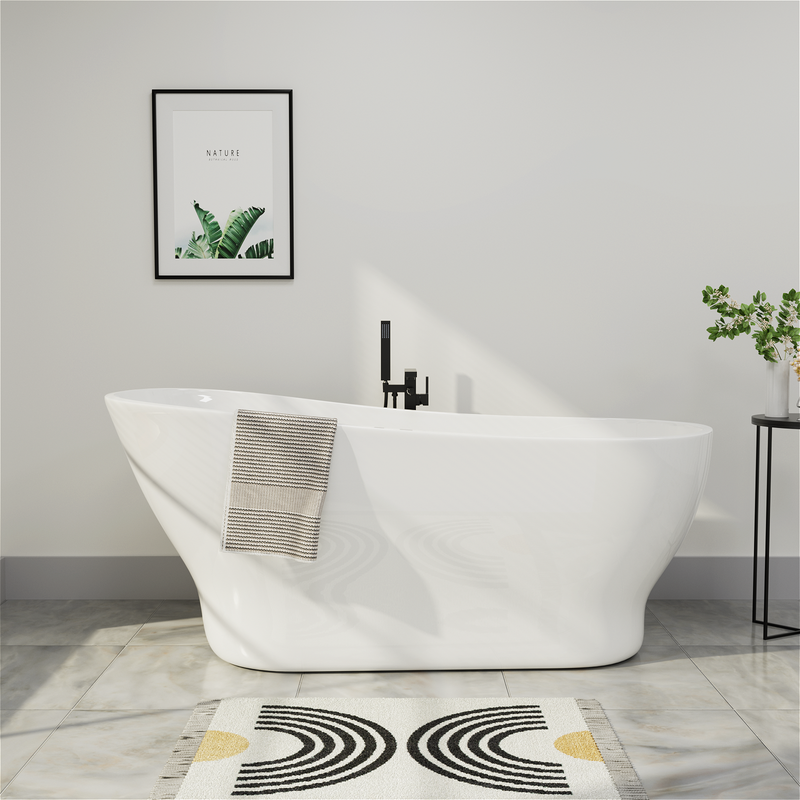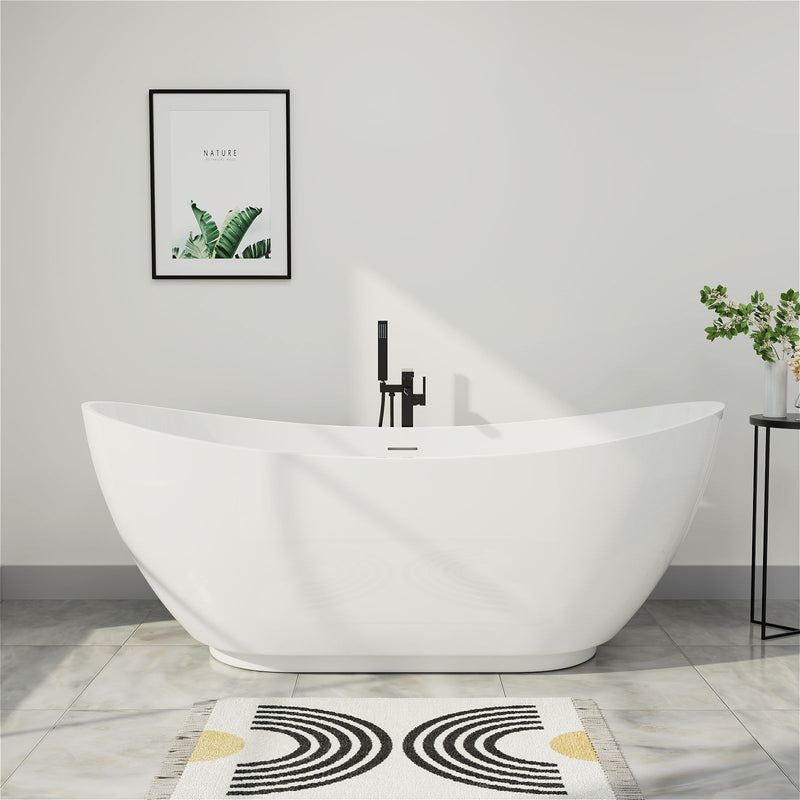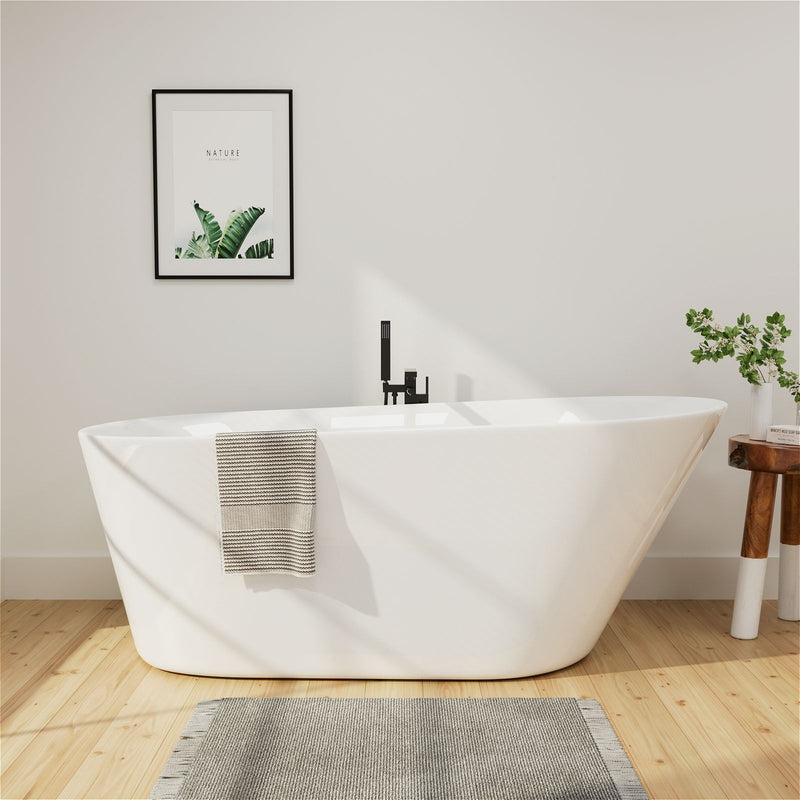What is a Shower Base?
A shower base acts as a waterproof floor within a shower enclosure. It is usually prefabricated and ready to install. It can be installed over the subfloor, meaning you don't have to lay down sloping mortar and tiles. However, a shower base can also refer to a tiled shower floor that is laid with wet cement, sand mixture, or other types of mortar. Tile shower bases are more challenging to install and remove than other types of bases.

What are the Different Shapes of Shower Bases?
Shower bases come in a variety of shapes, but the most common are rectangular, square, and angular. Other shapes include round, semi-circular, pentagonal, and oval. Round is currently trending. Manufacturers are creative, and you should research the various styles to find the perfect base for your needs. But remember that the base shape must match the shower enclosure; any gaps will cause leaks.
Square: A versatile choice that fits many door styles, such as folding doors. Great for small bathrooms.
Rectangular: Provides the comfort of a spacious shower
Corner: This option is the perfect compromise between comfort and space saving.
Types of Shower Bases
There are various types of shower bases available in the market:
Single Threshold Shower Bases: These units are designed for niche installation and have a raised edge (threshold) to avoid water draining outwards.
Double Threshold Shower Bases: They are angled bases designed to be installed in the corners of the bathroom.
Accessible Bases: These shower bases are designed for easy access and are perfect for people with limited mobility.
Corner Shower Bases: These bases are designed for corner installation but have a unique angled front edge to save more space.
Tile Basin Bases: To achieve the look of seamless custom tile, these bases are designed to blend in with the surrounding tile shower.
How to Install a Shower Base?
There are three main ways to install a shower base. Different types of shower bases require different installation techniques as some materials require specific methods.
Raised Installation
Raised installation is quick and easy. With this shower base installation method, the base is placed directly on the ground, creating a step of at least 5 cm in height. This installation process requires a built-in vertical suction device.
Flush Installation
Flush shower enclosure installation eliminates the need for steps, creating a walk-in shower. This installation is ideal for new builds or complete bathroom remodels where a vertical recessed siphon is required.
Ready-to-Tile Installation
Older people and those with limited mobility can benefit from a ready-to-tile installation as it creates a walk-in shower. The base is tiled to match the bathroom floor, leaving only the shower drain grate exposed. The base is designed with a slope to facilitate drainage.
Ready-to-tile shower bases require a floor layout that includes the following:
- A minimum 90mm plug
- A 50mm drain pipe
- A minimum 2% pipe slope
- This type of base is best used with smaller, non-slip tiles.
Factors to Consider When Buying a Shower Base
Choosing a shower base requires careful consideration. Here are some factors to consider:

Material: The most common materials include acrylic, fiberglass, stone resin, and enameled steel. Learn the benefits and durability of each material to suit your needs.
Size and shape: Your choice should match the available space and the layout of your bathroom.
Style: Consider modern, classic, minimalist, or luxurious styles, depending on your taste and the overall theme of your bathroom.
Threshold Design: Choose a design that suits your needs, with single, double or barrier-free designs.
Installation Type: Depending on your preference, you can choose between alcove, corner or freestanding installation.
Benefits of Shower Bases
Availability in a Variety of Sizes
One of the great benefits of shower bases is that they are available in a variety of sizes. No matter the size of your bathroom, there is always a shower base that is suitable. From small squares to larger rectangles, there are a variety of sizes to choose from, depending on the available space in your bathroom.
Different Base Types
In addition to a variety of sizes, shower bases are available in a variety of types. They include alcove bases, corner bases, freestanding bases and barrier-free bases, among others. Each type is suitable for a specific bathroom layout, giving you the flexibility to choose the style that best suits your preferences.
Quick Installation
Shower bases, especially prefabricated bases, are easier to install than traditional shower floors. They are pre-formed and can be installed directly into the existing space in your bathroom. This means that you can have a fully functional shower area in no time.
Perfect for DIY Enthusiasts
If you are a DIY enthusiast, then shower bases may be the ideal choice for you. We provide easy-to-follow installation instructions, making it easy for you to install it yourself without the expense of hiring a professional.
Durable Construction
Most shower bases are made of materials known for their durability, such as acrylic or fiberglass. These materials are able to withstand frequent use, ensuring that your shower base will last for a long time.
Easy to Clean
Unlike traditional tile bathroom floors, which can easily lead to discoloration in the gaps, shower bases are easy to clean because they usually have a non-porous surface. This means that you can spend less time on maintenance and more time enjoying your shower.
Disadvantages of Shower Bases
Limited Customization Options
Compared to tile shower enclosures, which offer a wealth of design and customization options, shower base options are very limited. Designs and layouts are all pre-set, leaving little room for personalization.
May Not Match Existing Decor
While shower bases are available in a variety of colors, it may be difficult to perfectly match your existing bathroom decor. This is especially true if your bathroom decoration is unique or high-end.
Difficult to Replace
If a shower base is damaged, it is more difficult to replace it than replacing individual shower tiles. This means that you may need the help of a professional to remove the old base and install a new one.
Size Limitations
While shower bases come in a variety of sizes, the largest size is usually smaller than what you can achieve with custom tile. If you have a large shower space, a shower base may not be the best choice.

Higher Initial Cost
Shower bases have a higher initial cost than tile shower floors, especially high-quality bases. The price usually includes the base itself and professional installation fees.
May Impact Resale Value
Choosing a shower base over a custom shower enclosure may affect the resale value of your home. Some buyers prefer higher-end finishes in their bathrooms, such as tile, and they may view shower bases as a sign of cost savings.
FAQs About Shower Bases
What are the Different Types of Shower Bases?
There are four main types of shower bases: acrylic bases, fiberglass bases, custom tile bases, and prefabricated tile bases. Each type has its own unique advantages, for example, acrylic bases and fiberglass bases are affordable and easy to install, while tile bases offer more customization options.
Can I Install the Shower Base Myself?
Yes, you can install a shower base yourself. However, this requires some basic plumbing and carpentry skills. If you are not confident in your abilities, it is best to hire a professional to avoid potential problems later.
What size shower base do I need?
The size of a shower base depends on the available space in your bathroom and your personal preference. Generally speaking, standard shower bases range in size from 32 inches x 32 inches to 60 inches x 36 inches. If your bathroom space allows, a larger shower base can enhance your shower experience.
Is a shower base better than a bathtub?
This largely depends on personal preference. Bathtubs usually take up more space and are more difficult to get in and out of, especially for the elderly or those with disabilities. Shower bases, on the other hand, are generally more compact and easier to use for daily use.
What maintenance does a shower base require?
Regular cleaning is necessary to prevent soap scum and mildew buildup. Some shower base materials, such as acrylic and fiberglass, are low-maintenance because they are stain-resistant. However, tile shower bases may need to be re-grouted over time to keep them looking their best.
How do I clean an acrylic shower base?
For acrylic shower enclosures and doors, a non-abrasive all-purpose cleaner works best. You can try using pine oil or a low-concentration baking soda mixture with a small amount of grit to reduce the effort required to remove shower grime. Overly abrasive solutions may scratch acrylic surfaces.
How to Clean a Stone-Based Shower?
Soap scum can easily cling to natural stone because it is more porous than other shower base materials. Removing this sludge-like substance may require professional cleaning services. It's best to take preventative measures and try to prevent soap scum buildup by following these steps:
- Wipe the shower with a towel after each use
- Remove gunk with a squeegee
- Seal and reseal the surface regularly
These preventative measures should reduce soap scum buildup, but you may still see some soap scum buildup. If this occurs, use a non-acidic cleaner before calling in professional help—pH-neutral cleaning products work best for certain types of stone.
How Long Does a Shower Base Last?
The lifespan of a shower base depends on the material and how well it is maintained. Typically, acrylic or fiberglass shower bases last 10 to 15 years, while tile bases can last more than 20 years if properly maintained.
Can I replace the shower base without replacing the entire shower?
Yes. It is possible to replace just the shower base without disturbing the existing tile or shower enclosure. But this depends a lot on the condition of the existing shower base, the size of the replacement base, and the expertise of the installer.
Are there any special considerations for installing a shower base in a basement?
Yes, drainage issues are critical when installing a shower base in a basement. The shower base must be elevated so that the drainage system can function properly and move water away from the base.





